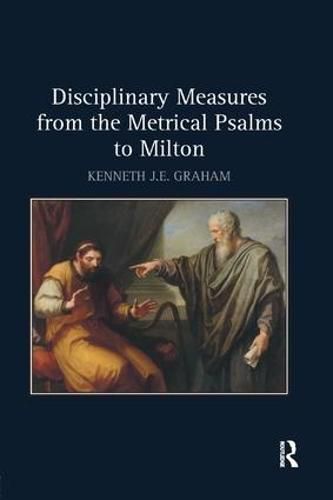Readings Newsletter
Become a Readings Member to make your shopping experience even easier.
Sign in or sign up for free!
You’re not far away from qualifying for FREE standard shipping within Australia
You’ve qualified for FREE standard shipping within Australia
The cart is loading…






Disciplinary Measures from the Metrical Psalms to Milton studies the relationship between English poetry and church discipline in four carefully chosen bodies of poetry written between the Reformation and the death of John Milton. Its primary goal is to fill a gap in the field of Protestant poetics, which has never produced a study focused on the way in which poetry participates in and reflects on the post-Reformation English Church’s attempts to govern conduct. Its secondary goal is to revise the understandings of discipline which social theorists and historians have offered, and which literary critics have largely accepted. It argues that knowledge of the early modern culture of discipline illuminates some important poetic traditions and some major English poets, and it shows that this poetry in turn throws light on verbal and affective aspects of the disciplinary process that prove difficult to access through other sources, challenging assumptions about the means of social control, the structures of authority, and the practical implications of doctrinal change. More specifically, Disciplinary Measures argues that while poetry can help us to understand the oppressive potential of church discipline, it can also help us to recover a more positive sense of discipline as a spiritual cure.
$9.00 standard shipping within Australia
FREE standard shipping within Australia for orders over $100.00
Express & International shipping calculated at checkout
Disciplinary Measures from the Metrical Psalms to Milton studies the relationship between English poetry and church discipline in four carefully chosen bodies of poetry written between the Reformation and the death of John Milton. Its primary goal is to fill a gap in the field of Protestant poetics, which has never produced a study focused on the way in which poetry participates in and reflects on the post-Reformation English Church’s attempts to govern conduct. Its secondary goal is to revise the understandings of discipline which social theorists and historians have offered, and which literary critics have largely accepted. It argues that knowledge of the early modern culture of discipline illuminates some important poetic traditions and some major English poets, and it shows that this poetry in turn throws light on verbal and affective aspects of the disciplinary process that prove difficult to access through other sources, challenging assumptions about the means of social control, the structures of authority, and the practical implications of doctrinal change. More specifically, Disciplinary Measures argues that while poetry can help us to understand the oppressive potential of church discipline, it can also help us to recover a more positive sense of discipline as a spiritual cure.